|
In 1968 the Berlin Wall was high enough to protect East Berlin's
workers and peasants from West Berlin's possible nuclear attacks and from
themselves getting ideas, so my father could return with a safe conscience.
It was because
of the wall that people from East- and West Germany didn't live together
in one house any more, now they were only neighbours. And the higher the
wall became between their houses, the more anonymous became life. Adults
who had said hello to each other in former times did their own thing now,
and the children didn't play together any more, either.
My father didn't
like that very much, so he and a couple of young people from the West
went to Berlin all the Whitsuntides to meet young people from the East.
I started to go with them in 1978. My father prepared us thoroughly for
the trips, we worked out strategies for example, so that we wouldn't attract
attention on the other side. The conspirational meetings with the counter-revolutionary
powers took place in the parish hall of the Samaritan congregation in
Berlin-Friedrichshain. Priest Rainer Eppelmann, a very nice and committed
person, was the key player.
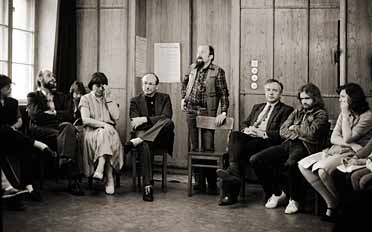
East-West encounter in Samaritan congregation in Berlin-Friedrichshain.
He had a
small group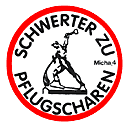 of brave and committed young people around him, who dared to wear "Swords
to Plowshares"
of brave and committed young people around him, who dared to wear "Swords
to Plowshares"
-badges in public, even though they were arrested and put behind bars
for that again and again.
Communication
with the class enemy was surprisingly peaceful. Every day we had to pass
the border crossing point "Friedrichstraße" to go back to West Berlin
until midnight. Berliners called this terminal "the Palace of Tears".
We do know why.
The "East-West
Encounter Seminar" (that was the official term) still took place Whitsun
1989, like all the years before. Nobody dared, though, to hope that we
could all wake up from this nightmare in the very same year.
Yet in summer
already, there was a tide of refugees via Hungary and the Czech Republic.
The situation went out of control and suddenly even "normal" people on
the other side dared to speak up.
Rainer told
us that a new party "Demokratischer Aufbruch" ("Democratic Awakening")
was going to be formed. Then suddenly everything happened very quickly.
On 9th of November
1989 something happened that was to go down in history: GDR, more or less
"by accident", opened the border. "Nobody intends to open the wall" -
this time nobody said that, but then again nobody had expected it, either.
I didn´t have
the opportunity to witness GDR making another slip like that. I wasn't
even in Germany at that time. I was on business in Paris.
One week later
I wrote down the following in my diary:
"I read in the news that GDR had opened the border. A couple of times
I could watch the reports on French television as well, especially on
FR3. I´m really not the kind of person who easily gets carried away by
emotions. But I have to admit that I havn´t ever been moved so deeply
like these days. I remembered all the leisure-time activities in Berlin,
the sad goodbyes at Friedrichstraße station, my endless walks along the
wall, my school report on the subject, the memories of my own time in
Berlin, and the fact that I´m a Berliner myself just because of the wall.
Anyway, I was absolutely delighted. I bought several newspapers at once,
and when I saw the "Libération"´s front page, which showed just a picture
of hundreds of people sitting on the wall, I couldn´t help showing it
triumphantly to all the other people at the exhibition stand. The same
Saturday evening we went to an Indonesian restaurant near the hotel, together
with Jutta Böhme, Mitsubishi representative. We celebrated the opening
of the border."
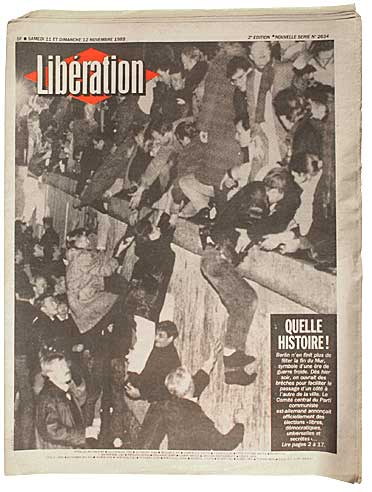
So it was by accident that the wall was opened and the project socialism
dropped. There were postcards available, showing Marx and saying: "No
offence, it was just an idea..."
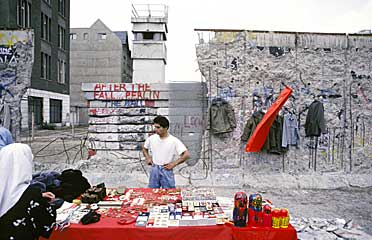
Berlin 1990 - GDR clearance sales have started
It took a few months until I could see the unbelievable myself. That was
Whitsun 1990. Meanwhile, the wall had become an object very much sought
after by souvenir collectors. There was hammering and knocking everywhere,
just like in a quarry.
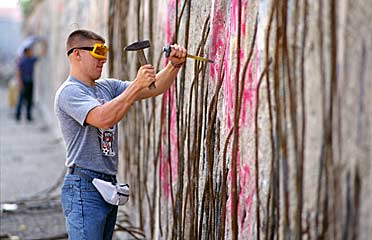
Apart from that, it was absolutely fascinating that you could walk from
Kreuzberg to the Alexanderplatz in no time, whereas in the past it took
you several hours because of the detours and the border controls at Friedrichstraße
station. Suddenly, Berlin´s entire geography was completely different.
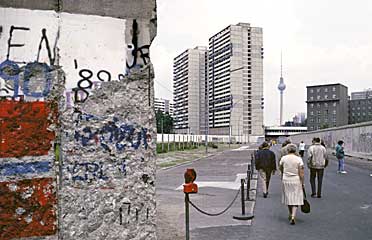
In 1990 Berlin
suddenly offered completely new perspectives, not only in respect of taking
pictures of the wall, but also those concerning Germany´s future.
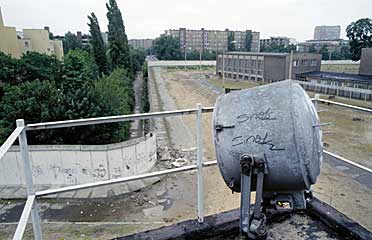
But even though
it was only half a year later, the euphoria of Germany's reunification
had disappeared.
The atmosphere
at the last East-West-Encounter meeting was disappointing as well. It
was like having been stuck in an elevator with others for days and gotten
to know each other better, and after the "rescue" everybody only wants
to go home. "We'll meet again", they would promise, but never do it. Strange
how quickly one can forget!
The East Germans
have quickly forgotten their true heroes, the civil rights activists who
spoke up already in times when they still had to make sacrifices for it.
I'm not talking about the ones who screamed out "We are the people", but
the ones who wore "Swords to Plowshares"-badges.
Instead of
remembering their peace movement, the wannabe-braves celebrated themselves.
Yet in 1989 the crowd (500.000 on 4th of November 1989 at the Alexanderplatz)
could only have been that powerful because another brave man, Mikhail
Gorbachev, had tried out new avenues in Moscow.
But the West
Germans had forgotten, too. Actually, Germany's reunification belonged
to "times past".
A couple of months after the wall had fallen, a close friend of mine said
that it was beginning to get on her nerves that so many East Germans came
to the West and that there were hardly any chances to find a flat. She
added that you could almost become xenophobic.
Probably, we had simply been separated for too much time. Whereas
in 1960 the word "freedom" had been a value in itself, in 1990 many people
looked at it as a synonym for money, travel, cars, video players, that
is for personal infinite prosperity.
Today, after
another 10 years, most of the reunited Germans are spoilt, hedonistic
and selfish - incapable of even thinking about the political dimension
of the word "freedom".
And no Kennedy
to be seen, who urges:
"So let
me ask you, as I close, to lift your eyes beyond the dangers of today,
to the hopes of tomorrow, beyond the freedom merely of this city of Berlin,
or your country of Germany, to the advance of freedom everywhere, beyond
the wall to the day of peace with justice, beyond yourselves and ourselves
to all mankind."
|

![]()